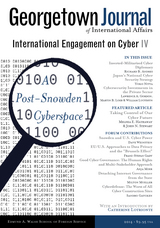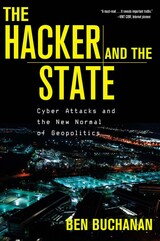
Each spring, the Cyber Project at Georgetown University’s Institute for Law, Science, and Global Security convenes a conference of leading international experts from academia, the private sector, and government to address cutting-edge issues in cybersecurity.
This issue begins with a group of articles under the theme A Post-Snowden Cyberspace, describing how Edward Snowden’s revelations directly or indirectly changed the way the global community understands cybersecurity and cyber law. Other topics covered include cyber weapons, cyber deterrence, Japan’s cybersecurity strategy, data protection in the private sector, executive accountability for data breaches, minimum security standards for connected devices, and the problem of underinvestment in cybersecurity.
Please note, this special issue is not included in the subscription to the journal.
The Georgetown Journal of International Affairs is the official publication of the Edmund A. Walsh School of Foreign Service at Georgetown University. Each issue of the journal provides readers with a diverse array of timely, peer-reviewed content penned by top policymakers, business leaders, and academic luminaries.

“A must-read…It reveals important truths.”
—Vint Cerf, Internet pioneer
“One of the finest books on information security published so far in this century—easily accessible, tightly argued, superbly well-sourced, intimidatingly perceptive.”
—Thomas Rid, author of Active Measures
Cyber attacks are less destructive than we thought they would be—but they are more pervasive, and much harder to prevent. With little fanfare and only occasional scrutiny, they target our banks, our tech and health systems, our democracy, and impact every aspect of our lives. Packed with insider information based on interviews with key players in defense and cyber security, declassified files, and forensic analysis of company reports, The Hacker and the State explores the real geopolitical competition of the digital age and reveals little-known details of how China, Russia, North Korea, Britain, and the United States hack one another in a relentless struggle for dominance. It moves deftly from underseas cable taps to underground nuclear sabotage, from blackouts and data breaches to election interference and billion-dollar heists.
Ben Buchanan brings to life this continuous cycle of espionage and deception, attack and counterattack, destabilization and retaliation. Quietly, insidiously, cyber attacks have reshaped our national-security priorities and transformed spycraft and statecraft. The United States and its allies can no longer dominate the way they once did. From now on, the nation that hacks best will triumph.
“A helpful reminder…of the sheer diligence and seriousness of purpose exhibited by the Russians in their mission.”
—Jonathan Freedland, New York Review of Books
“The best examination I have read of how increasingly dramatic developments in cyberspace are defining the ‘new normal’ of geopolitics in the digital age.”
—General David Petraeus, former Director of the CIA
“Fundamentally changes the way we think about cyber operations from ‘war’ to something of significant import that is not war—what Buchanan refers to as ‘real geopolitical competition.’”
—Richard Harknett, former Scholar-in-Residence at United States Cyber Command

Cyber weapons and the possibility of cyber conflict—including interference in foreign political campaigns, industrial sabotage, attacks on infrastructure, and combined military campaigns—require policymakers, scholars, and citizens to rethink twenty-first-century warfare. Yet because cyber capabilities are so new and continually developing, there is little agreement about how they will be deployed, how effective they can be, and how they can be managed.
Written by leading scholars, the fourteen case studies in this volume will help policymakers, scholars, and students make sense of contemporary cyber conflict through historical analogies to past military-technological problems. The chapters are divided into three groups. The first—What Are Cyber Weapons Like?—examines the characteristics of cyber capabilities and how their use for intelligence gathering, signaling, and precision striking compares with earlier technologies for such missions. The second section—What Might Cyber Wars Be Like?—explores how lessons from several wars since the early nineteenth century, including the World Wars, could apply—or not—to cyber conflict in the twenty-first century. The final section—What Is Preventing and/or Managing Cyber Conflict Like?—offers lessons from past cases of managing threatening actors and technologies.
READERS
Browse our collection.
PUBLISHERS
See BiblioVault's publisher services.
STUDENT SERVICES
Files for college accessibility offices.
UChicago Accessibility Resources
home | accessibility | search | about | contact us
BiblioVault ® 2001 - 2024
The University of Chicago Press









